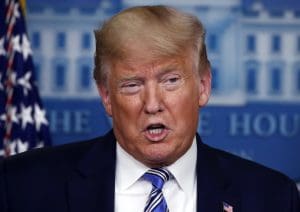Trump keeps pushing miracle cures — and it's hurting Americans
A man from Arizona has died after ingesting a substance Trump touted as a cure.

Donald Trump continues to peddle false hope about a cure for COVID-19, the disease caused by the new coronavirus, even as health officials have warned against doing so. And his bad information has already begun to hurt Americans and sow confusion around the world.
“HYDROXYCHLOROQUINE & AZITHROMYCIN, taken together, have a real chance to be one of the biggest game changers in the history of medicine,” Trump tweeted on Saturday.
“Hopefully they will BOTH (H works better with A, International Journal of Antimicrobial Agents) … be put in use IMMEDIATELY. PEOPLE ARE DYING, MOVE FAST, and GOD BLESS EVERYONE!” he added.
At press conferences over the weekend, Trump reiterated that the combination of drugs could cure or prevent COVID-19, even as Dr. Anthony Fauci, the top infectious disease expert at the National Institutes of Health, said there was no evidence the drugs could help.
“No,” Fauci said on Saturday when asked if hydroxychloroquine, a drug used to treat malaria and other diseases, could cure COVID-19. “The answer … is no.”
Days later, a man died and his wife was hospitalized after the two ingested chloroquine phosphate, an additive used in fish tank cleaner that is also found in the anti-malarial drug Trump touted.
“We saw Trump on TV — every channel — and all of his buddies and that this was safe,” the woman, based in Arizona, told NBC News. “Trump kept saying it was basically pretty much a cure.”
She now has advice for others.
“Don’t believe anything that the president says and his people … call your doctor,” she said.
The World Health Organization also warned about the dangers of Trump’s rhetoric.
“Using untested medicines without the right evidence could raise false hope and even do more harm than good,” Tedros Adhanom Ghebreyesus, the director-general of the World Health Organization, said on Monday.
Trump’s repeated insistence that the drugs could work against COVID-19 has added to a chaotic situation across the country and around the world.
In the United States, patients who need hydroxychloroquine to treat diseases such as lupus and rheumatoid arthritis are in fear of not being able to fill their prescriptions, the New York Times reported on Friday. Lupus patients who do not take the medicine can become very ill.
On Tuesday, the Times warned that doctors are prescribing the medication to themselves and their family members as a precaution, even though there is no proof that it works, adding to the anxiety over a potential shortage of the drug.
Hydroxychloroquine prices are “skyrocketing” across Africa and South Asia, according to the Wall Street Journal, even as doctors warn against taking it to treat COVID-19.
“There is no known dosage for COVID-19 and whether it can actually cure it, it’s safer to avoid chloroquine,” Dr. Chris Kaganda, a Ugandan public health expert, told the Journal. “But you know these are desperate times.”
On Saturday, three people in Nigeria were hospitalized for overdosing on chloroquine, the Journal reported.
Social media companies and some government agencies are cracking down on the peddling of fake cures as the coronavirus pandemic continues to spread.
On March 19, Twitter announced that it would remove tweets containing misinformation about coronavirus cures. According to policies reported by the Guardian, Twitter will address content that “goes directly against guidance from authoritative sources of global and local public health information.”
By the end of February, retail giant Amazon had already pulled down more than 1 million items that sellers claimed could cure or protect against coronavirus.
The state of Missouri sued televangelist Jim Bakker for selling something called “Silver Solution” and claiming it could cure coronavirus within 12 hours.
Trump’s Department of Justice issued a press release on March 22 warning that those selling “bogus vaccines or cures” pose a danger to the public by “spreading misinformation and creating confusion.”
The release advises the public to “Ignore offers for a COVID-19 vaccine, cure, or treatment,” noting that any announcement of a treatment will not first appear in an “unsolicited sales pitch.”
Despite the crackdown, Trump’s tweets about unfounded cures for coronavirus have not been taken down.
Published with permission of The American Independent Foundation.
Recommended

Ohio doctors fear effects of emergency abortion care case set to go before U.S. Supreme Court
A federal law that allows emergency departments to treat patients without regard to their ability to pay will be under U.S. Supreme Court scrutiny this week, and Ohio doctors are concerned about the case’s local impact on emergency abortion care.
By Susan Tebben, Ohio Capital Journal - April 23, 2024
House GOP votes to end flu, whooping cough vaccine rules for foster and adoptive families
A bill to eliminate flu and whooping cough vaccine requirements for adoptive and foster families caring for babies and medically fragile kids is heading to the governor’s desk.
By Anita Wadhwani, Tennessee Lookout - March 26, 2024
U.S. House Speaker Johnson says IVF should be protected — just not by Congress
U.S. House Speaker Mike Johnson said Thursday that it’s up to states and not Congress to preserve access to in vitro fertilization, weighing in on a growing national debate and campaign issue.
By Jennifer Shutt, States Newsroom - March 14, 2024








































































